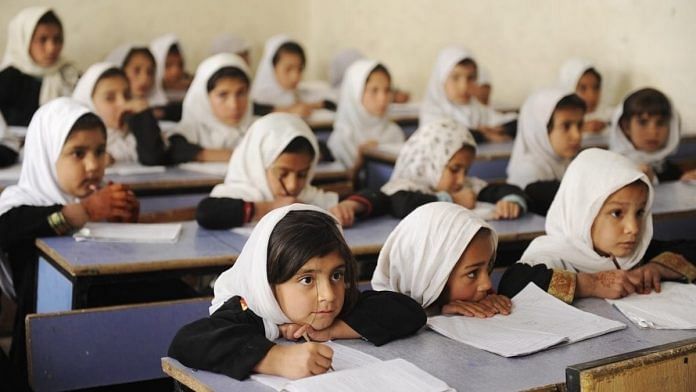New Delhi: For the last eight months, authorities at the Syed Jamaluddin Afghan School — the only school for Afghan refugees in India— have approached around 30 public and private schools in Delhi as part of a new roadmap to hold in-person classes.
The school, funded by the Afghan embassy until the Taliban takeover last year cut off its finances, has been holding online classes for its 250 pupils since the pandemic hit in 2020.
Last year, ThePrint reported that a shortage of funds, which was exacerbated by the fall of the Afghan government, caused the school to lose its building space. However, it received financial support from India’s Ministry of External Affairs (MEA) and since then, it has been exploring ways to hold in-person classes.
An official from the Afghan embassy said the school’s goal is to partner with another school to get access to 15 classrooms. These classrooms could then be used for in-person classes for Afghan students during after-school hours — that is, 3-6 pm — the official said.
For this, the school’s been approaching schools located in Delhi’s Bhogal (Jangpura), Ashram, Lajpat Nagar, and Nehru Nagar — that is, the areas where a majority of its students live — to ensure that transport is not an issue, the official said.
But the search hasn’t been easy.
“When we approach private schools, usually their offers are beyond our budget and require the permission of the Directorate of Education. With government schools, it is a longer process because they need further permission from government departments,” the official said.
The school is now looking at those run by the Municipal Corporation of Delhi schools.
“Unfortunately, in the last eight months, we have been unable to come to an agreement with any school in the area,” the official said.
Although the search will continue, the official said that the school will have to revert to online classes for the academic year starting 22 August.
Also Read: The forever war in Afghanistan is nowhere near its end. Now IS indulging in ethnic warfare
The challenging search
First set up in 1994 and supported by the Women’s Federation for World Peace (WFWP), the Afghan school has about 250 pupils from Classes 1-12 and employs 35 teaching and non-teaching staff.
Before the pandemic hit in 2020, Afghan students were being taught in a small basement at the bottom of a commercial building. However, the school was forced to give up the space last year because of a shortage of funds.
Navita Srikant, a development specialist and founding member of Gandhi Badshah Khan Educational Society who has been assisting the school in its search, said that certain schools raised “apprehensions” when approached.
“In my view, as an educationist, we need to embrace children from all walks of life in line. We cannot be defeated in our commitment by race, colour, or religion,” she told ThePrint.
Belqees Waheedi, an 18-year-old who graduated from the Afghan school in May this year, said that she and her fellow students struggled through the pandemic.
“Online classes were difficult due to internet issues and also because the teachers were not able to give us proper attention if we had doubts. I feel that even though the basement was very stuffy, [it] was better than online classes. I hope the school is successful in this new plan because nothing beats learning in a classroom,” Waheedi told ThePrint.
(Edited by Uttara Ramaswamy)
Also Read: Afghans stranded in India after Taliban takeover now returning home via Iran, Pakistan



